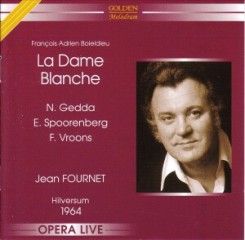François-Adrien Boieldieu – La Dame Blanche (1964)
François-Adrien Boieldieu – La Dame Blanche (1964)

01. Act I 02. Act IIa 03. Act IIb 04. Act III Anna - Erna Spoorenberg (soprano) Jenny - Sophia van Sante (mezzo-soprano) Marguerite - Mimi Aarden (mezzo-soprano) Georges Brown - Nicolai Gedda (tenor) Dickson - Frans Vroons (tenor) Gaveston - Guus Hoekman (bass) Mac Irton - Henk Driessen (bass) Groot Omroepkoor & Radio Filharmonisch Orkest Jean Fournet (conductor) Matinee op de Vrije Zaterdag, Concertgebouw Amsterdam 28.XI.1964 Direct FM-broadcast Hilversum 4 (NL)
La Dame Blanche (The White Lady) was among the most popular French comic operas of the nineteenth century; it had over 1,000 performances at Paris' Opéra-Comique alone. Although it has since faded into the annals of operatic history, it shows its composer, Boieldieu, and the very genre it inhabits at their best. La Dame Blanche also demonstrates that even such a staunchly French composer as Boieldieu -- who struggled to uphold traditional French musical values against the rising tide of Italian opera -- was unable to resist the dramatic and musical appeal of Italian forms, especially in his writing for vocal ensembles. Also notable are the many folk-like tunes and dances that allude to the story's Scottish setting.
Eugène Scribe's libretto for La Dame Blanche was drawn from three separate novels of Walter Scott: Guy Mannering, The Monastery, and The Abbott. The merging of these three sources into a unified dramatic structure marks this as one of Scribe's finer efforts. The plot revolves around a struggle for ownership of a Scottish castle, the rightful owners of which, the Count and Countess Avenel, are both deceased; their opportunistic and greedy steward attempts to claim the castle, and the noble title, for himself, but he is opposed by the Count and Countesses orphan daughter, who invokes the legend of the White Lady, the Avenel's guardian spirit, in her plans. In the process, Anna is reunited with her long-lost sweetheart, the unknowing rightful heir to the title and castle, Julien (introduced as George Brown, a military officer). Scribe's treatment of the haunting "White Lady" subject matter was especially ripe for musical invention, and is surely one of the primary reasons for the opera's success.
Boieldieu's score is notable for a group of particularly memorable numbers -- especially the "Ballad of the White Lady," sung by the peasant girl, Jenny, in the first act, and the young Brown's first aria. However, neither of these surpasses the skill, wit, and thorough inventiveness of the central auction scene, during which the rival parties bid for the castle. More than any other number in the opera, it betrays Boieldieu's digestion of the best qualities of Rossini and thge other Italians, for whom the climactic ensemble was a dramatic mainstay. ---Rovi
download: uploaded yandex 4shared mediafire solidfiles mega zalivalka filecloudio anonfiles oboom








